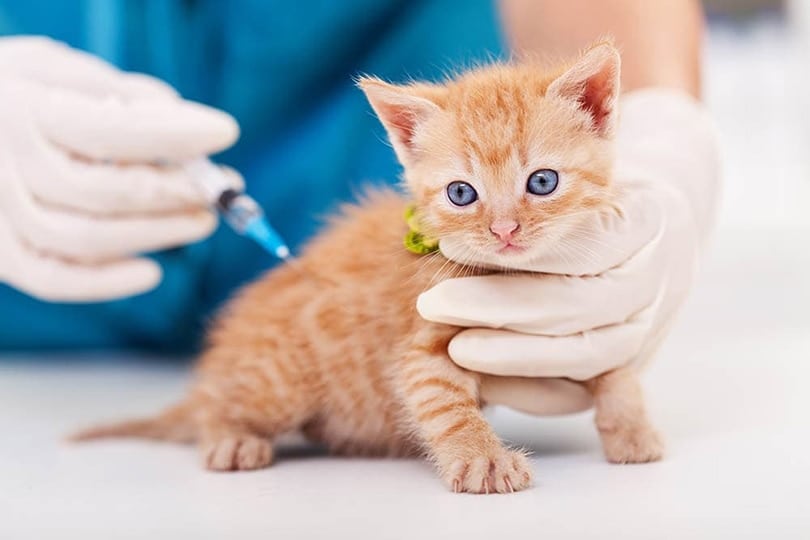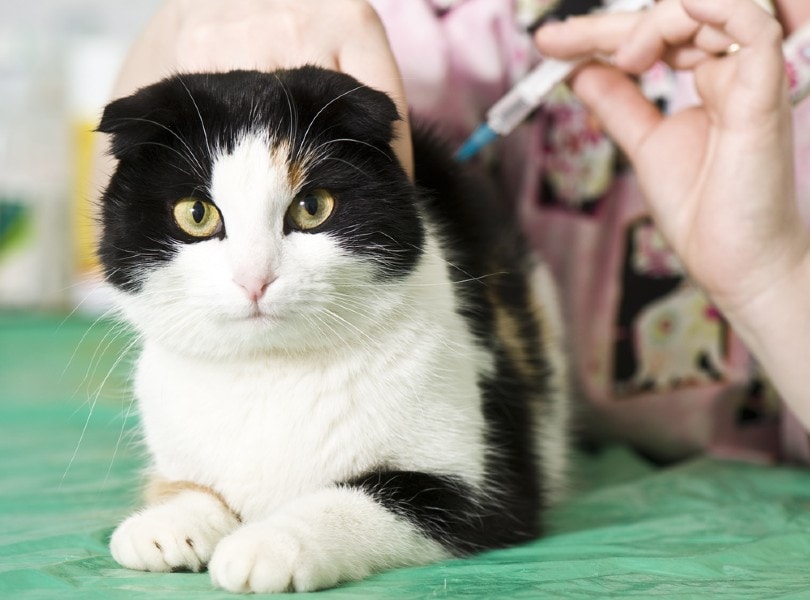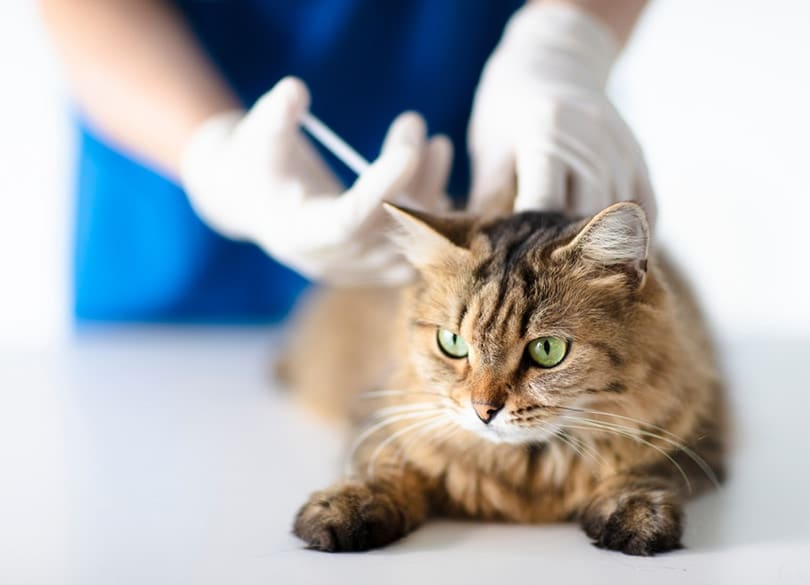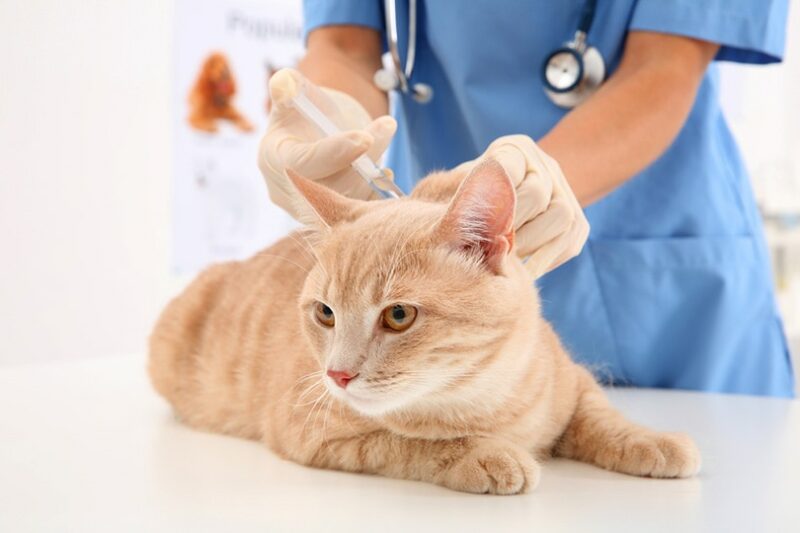Vaccines are designed to protect against a variety of feline diseases, including rabies virus, feline leukemia virus, feline distemper (also called parvovirus), feline calicivirus, and feline herpes virus. The timing of vaccines can be a bit complicated, as well as what vaccines an individual cat actually needs.
Most cats receive a primary series of vaccines as kittens, given every 3–4 weeks until they reach a certain age. For adults, vaccines are given every 1–3 years, depending on what the vaccine is, and what type of lifestyle the adult cat is living.
One of the best ways to keep a cat healthy, is to ensure that they get the specific vaccines they need, which should be discussed on an annual basis with their vet. Vaccines can consist of core and non-core vaccines, depending on a cat’s lifestyle (i.e., indoor vs outdoor, how often they might board in a cattery, etc.), age, and other risk factors. Core vaccines are designed to protect against infectious diseases that are either life-threatening, or commonly encountered by the majority of cats. Non-core vaccines are those which may not be needed, depending on a particular cat’s risk factors.
To find out which vaccines an indoor cat generally needs, and the timing of these vaccines, read on!

How Do Vaccines Work?
To understand how vaccine schedules in cats are timed, you first need to understand how vaccines work, and what are core vaccines versus non-core vaccines.
Some vaccines, called “killed” vaccines, contain inactive DNA or RNA from a pathogen, such as a virus or bacteria. Some vaccines, called “modified live” vaccines, contain less pathogenic forms of the normal virus or bacteria. Some vaccines, called “vectored” or “recombinant” vaccines, contain only a small part of a virus or bacteria inserted into an organism, called a plasmid, that acts to amplify this portion of the virus or bacteria once an animal is vaccinated.
Modified live and killed vaccines are some of the original, more traditional vaccines. Vectored vaccines are a more recent scientific development. Each type of vaccines have possible pros and cons.
After receiving a vaccine, the body recognizes the foreign material contained in the vaccine, and produces an immune response. This response takes about 7–14 days to reach a peak response. This has to do with why vaccines are timed 3–4 weeks apart—to allow for this response, and then a settling of the immune system, before challenging it again with another vaccine.
Some vaccines made to combat infectious diseases that cats don’t routinely encountered, such as rabies, are considered effective after a single dose. Conversely, vaccines made to fight viruses that cats do commonly encounter, or that may have antibiodies received from their mom, generally require a minimum of two doses, sometimes more, depending on the cat’s age.
What Vaccines Does an Indoor Only Cat Need?

To determine what vaccines an indoor cat requires, they first need to be separated into kittens and adults.
Kittens receive their first vaccines in what is called a “primary vaccine course”. This involves vaccines that generally start around 8 weeks of age, and continue every 3–4 weeks, until they are 16 weeks of age or older. After 16 weeks of age, most kittens then need their next vaccine one year later.
- 8 weeks
- 12 weeks
- 16 weeks
Primary vaccines in kittens include their core vaccines (e.g., parvovirus, herpesvirus, and calicivirus), and potentially feline leukemia and rabies—depending on where they live, and their lifestyle risk factors. Rabies vaccines cannot be given to kittens until they are at least 12 weeks old.
Adult indoor cats fall into two categories for which vaccines they might need. For adult cats that have never been vaccinated, they generally get primary vaccines (just as a kitten would), along with a single booster 3–4 weeks later. The reason for this booster is that a single vaccine for herpes, calcicivirus, and panleukopenia may not be fully effective—therefore, a second vaccine provides a bit more protection. Rabies, on the other hand, produces good results after a single vaccine, making a single vaccine sufficient.
For adult cats that received their primary course as kittens, they generally receive boosters either annually or triennially, depending on the vaccine, how much time they spend outside or boarding with other cats, as well as their age.
What Are The Minimum Vaccines My Indoor Cat Needs?

Once they are an adult, an indoor-only cat that lives in an area without rabies may only need the following vaccines:
- Feline parvovirus
- Calicivirus
- Feline herpesvirus
The above may be given every three years, for some low risk cats. However, it is always a discussion to have with your veterinarian, to determine what vaccines, and what vaccine schedule, your cat needs.
Are There Instances Where A Cat Vaccine Schedule Might Change?
There are certain instances in which a cat may be deemed not healthy enough to receive a vaccine. Alternately, it might be too early for them to receive a vaccine. A veterinarian may choose to delay vaccination of a cat for the following reasons:
- Weight loss
- Not eating
- Urinary tract infection
- Upper respiratory infection
- Vomiting
- Diarrhea
- Too soon from last vaccine

Frequently Asked Questions (FAQs)
What are possible vaccine side effects?

Vaccines, as with any medication, can have potential side effects. One of the more well-known side effects, particularly in cats, is called a vaccine-associated fibrosarcoma. Fibrosarcomas are a cancer that forms from the cells forming the connective tissue layer under the skin. There is strong evidence to suggest that a combination of genetics, and certain vaccines, and vaccine adjuvants, can lead to the formation of these cancers in cats.
Many of these vaccines are now made in a different manner, to not contain adjuvants, and most vaccines in cats are also now given in specific locations of the body—so that if one of these cancers occurs, the vaccine that may have played a role can be identified.
Some common side effect for vaccines in cats include lethargy, vomiting, and diarrhea. Cats rarely develop anaphylaxis, or life-threatening allergic reactions to vaccines, facial swelling, hives, the same way many other species are prone to developing. If your cat does experience any reactions to a vaccine, report it to your vet, as the way your cat is vaccinated may need to be adjusted, moving forward.
How are vaccines given?
Most vaccines for cats are injections given under the skin, and are generally about 1 ml in volume. Other forms of vaccines include nasal drops and transdermal vaccines, but these are uncommonly encountered.
My cat is late for their vaccine. Does that change the schedule?
It depends. If your cat is a day or two late, or even a week late, for their annual booster, it is generally not a problem. If your cat is more than a week or two late for their primary course booster, they may need an additional booster vaccine.
Is my cat too old for vaccines?
In general, veterinarians no longer consider cats “too old” for most things. Sometimes, senior cats need the immunity provided from vaccines far more than adult cats. Discuss what risk factors exist for your senior cat—such as time spent outside, boarding around other cats and dogs, and any medical conditions—with your veterinarian, to determine which vaccines they recommend, and how often.

Conclusion
Vaccination in indoor cats is an important part of preventing serious illness, and keeping our furry friends healthy. Vaccines are not just something done once when they are kittens, they are a part of a lifelong health plan for your cat.
Featured Image Credit: Africa Studio, Shutterstock





